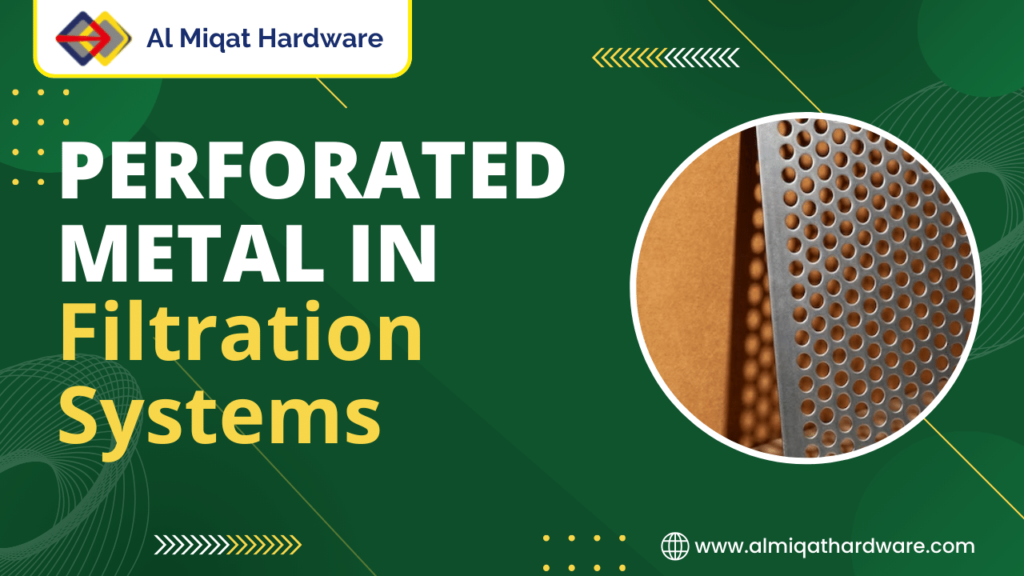When it comes to filtration systems, the choice of materials is crucial. One material that stands out for its effectiveness and versatility is perforated metal. With its unique design and properties, perforated metal plays a vital role in various filtration applications. In this blog, we’ll explore the benefits and applications of perforated metal in filtration systems.
1. Enhanced Filtration Efficiency:
Perforated metal offers enhanced filtration efficiency due to its precise hole patterns. These patterns are strategically designed to allow for optimal flow while effectively capturing unwanted particles. The size, shape, and distribution of the perforations can be customized to meet specific filtration requirements. This versatility makes perforated metal an excellent choice for applications where precision and efficiency are paramount.
2. Durability and Strength:
Filtration systems often encounter harsh operating conditions, including high temperatures, corrosive environments, and high-pressure flows. Perforated metal, typically made from durable materials like stainless steel, aluminum, or galvanized steel, provides excellent resistance to these conditions. Its robust construction ensures longevity and minimizes the risk of system failure. Additionally, the strength of perforated metal allows for the use of thinner sheets, reducing weight and cost without compromising performance.
3. Versatile Applications:
Perforated metal finds applications in a wide range of filtration systems. It is commonly used in HVAC systems to filter air and improve indoor air quality. The precise perforations help trap dust, pollen, and other airborne contaminants, ensuring clean and healthy air circulation. Perforated metal is also utilized in liquid filtration systems, such as water treatment plants, where it effectively removes impurities and sediments. Its versatility extends to industrial filtration applications, including oil and gas filtration, chemical processing, and food and beverage production.
4. Customization Options:
One of the key advantages of perforated metal is its customization options. Filtration requirements can vary significantly depending on the application. Perforated metal can be tailored to meet specific needs, such as hole size, shape, spacing, and open area percentage. This level of customization allows for precise control over filtration parameters, ensuring optimal performance and efficiency. Whether it’s fine filtration for delicate processes or coarse filtration for heavy-duty applications, perforated metal can be adapted to suit diverse needs.
5. Easy Maintenance and Cleaning:
Filtration systems require regular maintenance and cleaning to ensure continuous operation. Perforated metal offers convenience in this aspect. Its smooth surface and open hole design make it easy to clean and maintain. Whether it’s rinsing with water, using brushes, or employing specialized cleaning solutions, perforated metal can be easily maintained without compromising its filtration capabilities. This ease of maintenance translates to cost savings and improved system efficiency.
6. Noise and Vibration Reduction:
In addition to its filtration properties, perforated metal also provides benefits in terms of noise and vibration reduction. By incorporating perforated metal panels into filtration systems, unwanted noise and vibrations can be mitigated. The perforations act as sound absorbers, reducing noise levels and creating a quieter environment. This feature is particularly beneficial in HVAC systems where noise reduction is essential for comfort and productivity.
7. Sustainability:
Sustainability is a growing concern in various industries, and filtration systems are no exception. Perforated metal aligns with sustainable practices due to its recyclability and energy-efficient properties. Unlike some alternative materials, perforated metal can be recycled and repurposed, reducing waste and minimizing environmental impact. Additionally, its durability and longevity contribute to energy savings by reducing the need for frequent replacements.
Conclusion:
Perforated metal proves to be a valuable asset in filtration systems, offering enhanced filtration efficiency, durability, versatility, and customization options. Its ease of maintenance, noise reduction capabilities, and sustainability make it a compelling choice for various applications. Whether it’s air filtration, liquid filtration, or industrial filtration, perforated metal plays a crucial role in ensuring clean, efficient, and reliable filtration processes.


